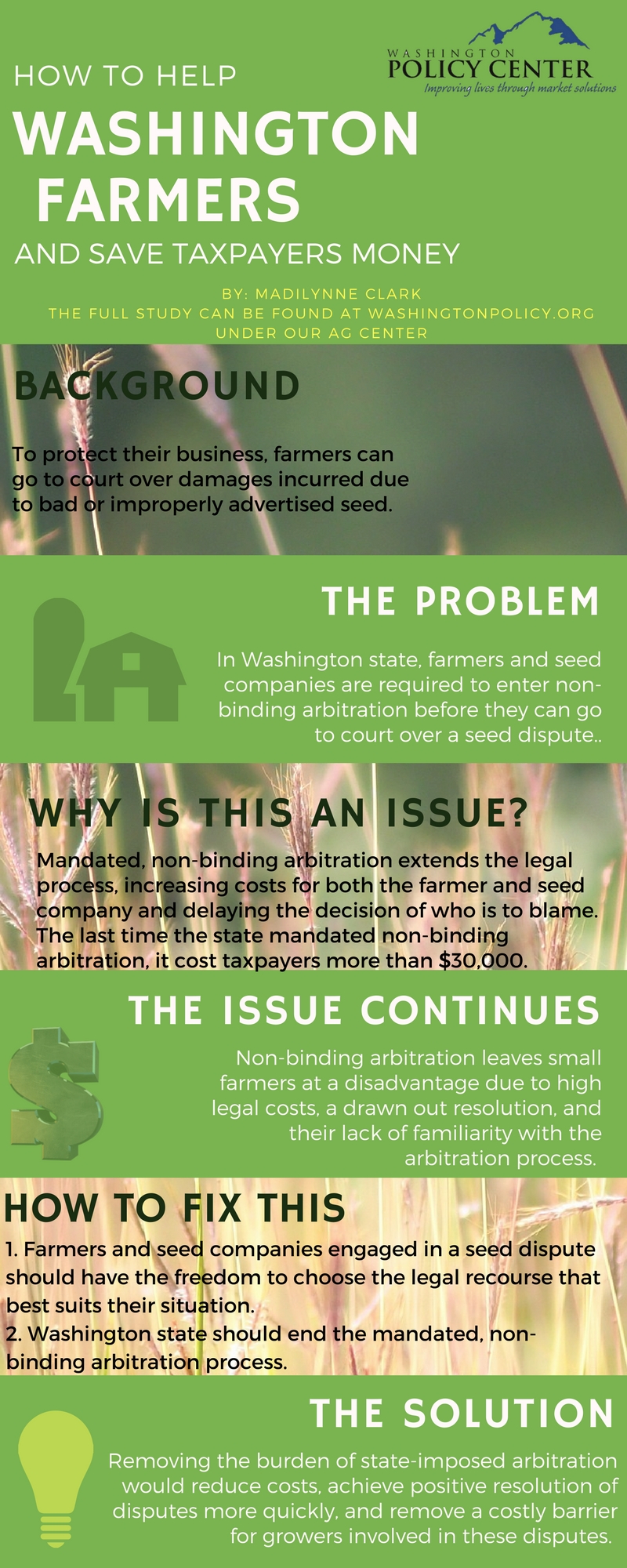![]() Download the full Legislative Memo
Download the full Legislative Memo
Key Findings
- Growers can sue seed manufacturers to cover damages incurred due to faulty seed. In many states, however, farmers making seed claims must first go through arbitration, mediation, or conciliation before they can seek legal action. Washington state requires the parties involved in a seed dispute to go through non-binding arbitration.
- Non-binding arbitration favors large companies over smaller farmers, because they are unlikely to be familiar with the arbitration process and have less ability to afford the added expense of extended litigation.
- Mandatory, non-binding arbitration was designed to decrease congestion in the courts and lowering costs for the parties involved – this has not happened.
- Mandatory, non-binding arbitration delays the inevitable litigation and increases costs, because parties are required to participate in arbitration but are not required to accept the decision.
- Washington state taxpayers and the parties involved in a seed dispute would be better off if allowed to choose their own legal options without mandated arbitration.
Introduction
The quality of seed is essential to all agricultural operations; at harvest time farmers will only reap what is sown. However, if what is sown is ineffective or misrepresented, growers are left in a dire predicament.
The capital investment needed to bring a crop to harvest can easily reach thousands or millions of dollars. For example, an irrigated alfalfa field in the Columbia Basin would spend $80 per acre on seed, equivalent to 15 percent of the total cost to bring it into production. When seed fails to produce, that is not the only cost a grower incurs.
Planting costs, including labor and fuel, are wasted when seed fails. For example, for that same irrigated alfalfa field, planting costs outside of seed (i.e. fuel, equipment, labor) are $18 per acre. Water, fertilizer, and crop protection products would still be applied until the seed is known to be ineffective (estimated costs are $39.80, $215.58, and $42.63 respectively), for a total of $316.01 per acre. These costs still must be paid, even if a crop is not harvested.
Growers can sue seed manufacturers to cover damages incurred due to faulty seed. In many states, however, farmers making seed claims must first go through arbitration, mediation, or conciliation before they can seek legal action. Washington state requires the parties involved in a seed dispute to go through non-binding arbitration.
Non-binding arbitration is administered by the Washington State Department of Agriculture (WSDA). The arbitration process is costly and time consuming for WSDA and for the private parties involved. Taxpayers are also hurt, because arbitration administration is publicly funded.
In the current legislative session, some lawmakers have introduced House Bill 1132 in an effort to eliminate this costly and pointless process (the companion bill is Senate Bill 5075). This Legislative Memo provides a summary of the bill and describes the advantages of ending mandatory non-binding arbitration for seed-related disputes in Washington state.




